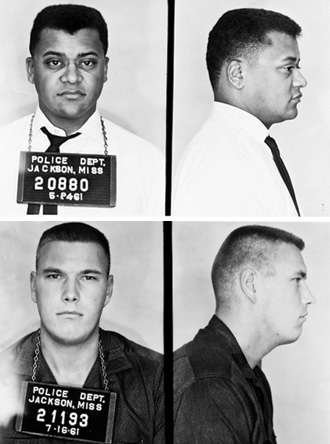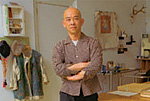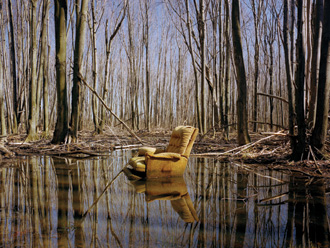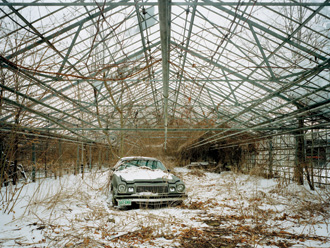Oberlin Alumni Magazine
Fall 2011
c
Thought Process
Should Oberlin Allow ROTC
on Campus?
Is it time for Oberlin to allow the Reserve Officers Training Corps (ROTC) onto its campus? We asked two members of the Oberlin community, an alumnus and a member of the Oberlin faculty, to share their views. Visit oberlin.edu/oam to share yours.
No
During an Oberlin convocation address in March 2011, a student posed a question to General Anthony Zinni to which I have since given much thought: Should Oberlin welcome ROTC to its campus?
After nearly a decade of researching and writing about junior ROTC (JROTC) and Latina/o youth in American public schools, I have come to appreciate how savvy young people can be in the face of limited economic, educational, and social opportunities. JROTC thrives in more than 1,500 U.S. high schools, and students who participate have complicated reasons for their involvement. Students often speak powerfully about the benefits JROTC offers, including the leadership skills they develop; the respect they get from teachers, school administrators and the broader community; and the social capital they acquire as a result of JROTC’s co-curricular activities. Yet they also articulate the constrained material and ideological conditions in which they make decisions about their future and how JROTC may provide them with certain advantages that would be otherwise unavailable. For universities facing renewed debates about reinstating ROTC to its campuses, careful attention to students’ material conditions is more urgent than ever as students strategize and devise ways to afford higher education.
Advocates of ROTC often point to the ways the program benefits its cadets and the broader college community by promoting diversity, democratizing campus life, and enhancing the development of young leaders who value service and civic engagement. While these might be valid arguments, they fail to consider the high cost of relying on the military to achieve our core values and goals of diversity and democratic exchange. ROTC might, in fact, succeed in maintaining Oberlin’s commitment to economic, racial, and political diversity, especially given the program’s ability to provide free tuition, monthly stipends, and job security in a moment of economic uncertainty. But we need to question the ethics of offering scholarships to young people (18 and 19 year olds) who commit themselves to lengthy military service before they have had the opportunity to explore academic subjects, deepen their intellectual capabilities, and develop a quality of mind that allows them to engage critically with the complexity of life and develop their own opinions, values, and beliefs. ROTC at Oberlin has the potential of signaling to students that it is okay for some to choose a career pathway prior to coming to college, while others should heed the advice we typically share with incoming students: Take intellectual risks and be open to new ideas and ways of being.
Military values such as obedience to an authoritarian chain of command are at odds with liberal arts learning and its emphasis on critical thinking, reflection, and creative expression. While I applaud the repeal of Don’t Ask, Don’t Tell, I believe we need to be clearer than ever about our core values and how we might strengthen them in ways that honor Oberlin’s history of idealism and willingness to embrace controversial positions in challenging times.
Gina Perez is associate professor and chair of Comparative American Studies at Oberlin.
Yes
With repeal recently of the Don’t Ask, Don’t Tell policy by Congress and President Obama, I encourage Oberlin College to allow Reserve Officers’ Training Corps on campus. ROTC would be instrumental in preparing Oberlin students to serve their country and at the same time allow them to benefit from the diversity of a liberal arts experience.
As a Navy officer and Oberlin grad, I have seen firsthand the attributes of an Oberlin education in military service. The demanding Oberlin classroom, with its focus on critical analysis and timely decision-making, enables military officers to respond effectively to the challenges of unconventional warfare in this generation. Oberlin’s emphasis on languages, cultural studies, and international relations aligns closely with the requisite skills for tomorrow’s second lieutenant.
Former secretaries of state Condoleezza Rice and George Schultz sent a letter to Stanford University urging the return of ROTC: "Our democracy is strongest when those who cherish our freedoms engage with those who defend them." I agree. ROTC’s presence and accessibility to undergraduates is a means of enhancing understanding between civilians and the military in society by first reducing the gap in college.
While other leading colleges and universities, including Harvard, Yale, and Stanford hold debates on their campuses and in their administrations about the return of ROTC, Oberlin College should lead the effort and bring ROTC onto its campus. Setting the standard not only demonstrates leadership to students, parents, and other schools, it is the right thing to do.
Bill Krissoff ’68 is an orthopedic surgeon on active duty in the United States Navy, at Naval Hospital Camp Pendleton in California. He deployed with combat surgical teams to Iraq in 2009 and Afghanistan in 2010.
Mighty Yeoman ’21 Record Challenged
 The mighty 1921 Yeomen team that beat Ohio State University. (courtesy of Oberlin College Archives)
The mighty 1921 Yeomen team that beat Ohio State University. (courtesy of Oberlin College Archives)
It’s not often that Oberlin athletics gets discussed in the build-up to a game in the Big 10 football conference, but this fall, when Ohio State University fell behind early in its game with the University of Toledo Rockets, people were talking Yeomen football. Why? Because if Toledo beat Ohio State, it would have displaced Oberlin as the last Ohio team to beat the Buckeyes. But the Yeomen record, set 90 years ago this October, remained intact, as Ohio State beat Toledo, 27 to 22. In other intrastate football news this fall, the Yeomen shut out rival Kenyon Lords, 42–zip.
When Freedom Led to Jail
James Lawson ’57, Hon ’10 (top), who left the Oberlin Theological Institute to join the civil rights struggle in the South, and Bill Svanoe ’59 were among the 439 original Freedom Riders, non-violent activists who boarded interstate buses in 1961 to challenge segregation laws and customs in the South. In Jackson, Mississippi, they were jailed upon arrival.
With the help of Marcia Aronoff ’65, Matthew Rinaldi ’69, and Oberlin College archivist Ken Grossi, the Oberlin Alumni Magazine is collecting stories from Oberlin alumni who participated in the civil rights struggle for a future article. If you haven’t already shared your story, we’d like to hear from you. You can e-mail us at Civil.Rights@oberlin.edu, or you can send mail to E.J. Dickson ’11, Oberlin Alumni Magazine, 247 West Lorain, Suite C, Oberlin, Ohio 44074.
Material collected for the article will become part of the permanent collection of the Oberlin College Archives (www.oberlin.edu/archive) and made available to students and historians for future research.

Pipo Nguyen-duy: The Guy Who Clicks the Shutter

(Professor Pipo Nguyen-duy)
East of Eden: Vietnam is the third installment of associate professor of art and photography Pipo Nguyen-duy’s ongoing photographic project examining the changing landscape of America, Vietnam, and the displacement of humanity since 9/11.
 Pictured: Lazy Boy, by Pipo Nguyen-duy
Pictured: Lazy Boy, by Pipo Nguyen-duy
Nguyen-duy’s project, launched in 2005, represents the culmination of two trips to Vietnam, where, traveling on a rented moped, he searched for war survivors to photograph against what he calls a "regenerated Southeast Asia." The result is a series of staged, large-scale, color photographs that explore hope and renewal 30 years after the Vietnam War.
"It was important to see it in a whole new way and to explore the anxiety we all feel everyday by living in a post-9/11 society," Nguyen-duy says. "Many of the subjects were in their 60s; two of them have since died. There was an urgency to the project; it was important to get to these subjects before their stories could no longer be told."
The project also has personal significance. A native of Hue, Vietnam, Nguyen-duy fled his homeland for America in 1975. His brother is an amputee; many of the photographs show people who have lost limbs or are disfigured. Nguyen-duy says he sought to capture the strength, courage, beauty, and wholeness of the people. "I want to show that we do have the capacity to overcome the challenges brought on by war."
 Pipo Nguyen-duy's 01-18-A-01.2005.
Pipo Nguyen-duy's 01-18-A-01.2005.
Nguyen-duy credits his family, his students, and Oberlin College for allowing him to take the necessary time away to research, travel, photograph, and assemble his work. "I’m just the guy who clicks the shutter. Without their support, this would not have been possible."
Earlier this year, the Guggenheim Memorial Foundation named Nguyen-duy a 2011 fellow in creative arts. Often called a midcareer award, the fellowship is awarded twice a year by the Guggenheim Foundation to individuals who have demonstrated exceptional capacity for productive scholarship or exceptional creative ability in the arts. Between 3,000 and 4,000 applications are received each year. About 220 are awarded.
The one-year fellowship allows Nguyen-duy a return trip to Vietnam, where he hopes to add at least 100 more images to the series. A graduate of Carleton College and the University of New Mexico at Albuquerque, he has served on Oberlin’s faculty since 1998.
For more information, visit www.piponguyen-duy.com
Endquotes
Screenwriter Mark Boal ’95, about his intention to write a movie about the capture of Osama bin Laden
“You know how they say the ‘pen is mightier than the sword’? Well, it’s true. Do not mess with novelists.”
Author Salman Rushdie in his convocation talk
Jacqueline A. Berrien ’83,
Chair of the U.S. Equal Employment Opportunity Commission
“What it feels like is that you are aboard a giant nuclear-armed dormitory. Picture, if you will, Harkness with cruise missiles.”
Radio host Ira Glass, describing the youth-dominated scene aboard the USS John C. Stennis deployed in the Arabian Sea at the beginning of the war in Afghanistan, in his convocation talk
From “Harry’s education, and yours: A father sends his son off to college, with wisdom from a boy wizard,” President Marvin Krislov’s letter to his college-bound son, Zac, published in the August 22, 2011, Baltimore Sun
Ed Helms ’96, about his character on the television show The Office
Sources: Boal: New York Times; Berrien: Washington Post’s On Leadership blog; Helms: Vancouver Sun
Want to respond? Send us a letter-to-the-editor.

Want to Respond?
Send us a letter-to-the-editor or leave a comment below. The comments section is to encourage lively discourse. Feel free to be spirited, but don't be abusive. The Oberlin Alumni Magazine reserves the right to delete posts it deems inappropriate.